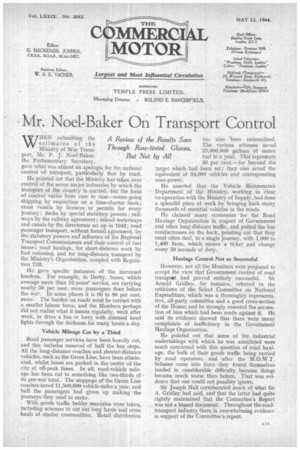Mr. 'Cod-Baker On Transport Control
Page 15

If you've noticed an error in this article please click here to report it so we can fix it.
WHEN submitting the estimates of the Ministry of War Transport, Mr. P. J. Noel:Baker, the Parliamentary Secretary, gave what was almost an apologia for the national control of transport, particularly that by road.
He pointed out that the Ministry has taken over control of the seven major industries by which the transport of the country is carried, but the form of control varies from case to case—ocean-going shipping by requisition on a time-charter basis ; coast vessels by licences_ or permits for every journey ; docks by special statutory powers; railways by the railway agreement ; inland waterways and canals by the directorate set up in 1942; road passenger transport, without formal agreement, by the statutory powers and influence of the Regional Transport Commissioners and their control of fuel issues ; road haulage, for short-distance work by fuel rationing, and for long-distance transport by the Ministry's Organization, coupled with Regulation 73B.
He gave specific instances of the increased burdens. For example, in Derby, buses, which average more than 12-years' service, are carrying nearly 50 per cent. more passengers than before the war. In some places it is GO to 80 per cent. more. The burden on roads must be carried with a smaller labour force, and the Members perhaps did not realize what it means regularly, week after week, to drive a bus or lorry with dimmed head lights through the darkness for many hours a day.
Vehicle Mileage Cut by a Third Road passenger services have been heavily cut, and this includes removal of half the bus stops. All the long-distance coaches and shOrter-distance vehicles, such as the Green Line, have been eliminated, whilst buses are parked in the centre of the city at off-peak times. In all, road-vehicle mileage has been cut t6 something like two-thirds of its pre-war total. The stoppage of the Green Line coaches saved 11,500,000 vehicle-miles a year, and half the passengers had given up making the journeys they used to make_ With goods traffic bolder meaSuies were taken, including schemes to cut out long hauls and cross hauls of similar commodities. Retail distribution has also been rationalized. The various schemes saved 25,000,000 gallons of motor fuel in a year. This represents 36 per cent,—far beyond the target which had been set ; they also saved the equivalent of 34,000 vehicles and corresponding man-power. He asserted that the Vehicle Maintenance Department of the Ministry, working in close co-operation with the Ministry of Supply, had done a splendid piece of work by bringing back many thousands of essential vehicles to the roads.
He claimed' many economies for the Road Haulage Organization in respect of Government and other long-distance traffic, and patted the bus• conductresses on the back, pointing out that they must often deal, in a single journey, with 1,000 to 1,400 fares, which means a ticket and change every 20 seconds of duty.
Haulage Control Not so Successful However, not all the Members were prepared to accept the view that Government control of road transpost had proved entirely successful. Sir Arnold Gridley, for instance, referred to the criticisms of the Select Committee ,on National Expenditure, which was a thoroughly representative, all-party committee and a good cross-section of the House, and he strongly resented the accusation of bias which had been made against it. He said its evidence showed that there were many complaints of inefficiency in the Government Haulage Organization.
He pointed out that some of the industrial undertakings with which he was associated were much concerned with this question of road haulage, the bulk of their goods traffic being carried by road operators, and after the M.O.W.T. Scheme came into force they found themselves landed in considerable difficulty because things became rnuch worse than before. That was evidence that one could not possibly ignore.
Sir Joseph Nall corroborated much of what Sir A. Gridley had said, and that the latter had quite rightly maintained that the Committee's Report was not a biased document.' Throughout the roadtransport industry. there is overwhelming evidence in support of the Committee's report.




















































